
Europe’s understanding of history is destined to change. This process is knocking at Europe’s door and promises to change completely the way we look at our past and, consequently, in our future. What it becomes central is, therefore, that the European Union is at the edge of a new internal revolution. This existential issue deserves strong leadership to be able to tackle it. The European Union, in the guise of the new Commission, Parliament and appointed Presidents must not underestimate the issue of multiculturalism not only from a security point of view but rather in a needed redefinition of European history and identity.
Karl Jaspers, in his 1945 Vorlesungen über die geistige Situation in Deutschland, states that the confrontation with the past is a precondition for the acquisition of political freedom in Europe. However, Europe has hardly been able to come to terms with its history. In fact, after 1945 hardly anyone was ready to face the memory of the horrors of the war -, especially in former fascist regimes. The past was considered something to be forgotten and a subject to be avoided as much as possible. This inability to come to terms with history has gradually resulted in a progressive fragmentation of the national collective memory.

The latter is the process of the ‘living memory’ of a specific social group. It is the way individuals and societies remember the events that preceded them. Being an act of remembering, Collective Memory is highly bounded in a space-time frame and to a specific group. In this sense, to align the memory of the past at the supranational level resulted to be a very difficult objective to achieve and a process also obstructed by the admission of new EU members throughout the different waves.
While in fact, the well-known “Never Again” concept became the leitmotif of post-war Western Europe, coherent theoretical perception of the European past (e.g. the Second World War and the Holocaust) has hardly been translated into a shared commonly agreed perception of history. Although there are numerous reasons for this, the simplest explanation is that it is already a hardly achievable objective at the national level- let aside at the supranational one. The process, in fact, takes into account the very experience of people and locals; the same understanding – or perception – of an event can hardly be shared by two groups, which had different experiences of the same phenomenon.
Take the Second World War, for example. While it might be commonly agreed – not even by everyone – that extremism and irrational nationalism brought misery, death and suffering to Europe, it might be difficult to expect the French and Germans to share the same memory of the issue; similarly, between Italy and France, or Italy and Greece.

Today, we are experiencing a similar phenomenon. Globalisation and the consecutive enlargement waves that have brought new members into the European Union (with different cultures, histories and perceptions of the past) has inevitably influenced the way the EU looks at its history. The previously shared agreement that fascism was a unique historical event – both for its cruelty and the Holocaust – was supplanted by an Eastern narrative that tended to put Fascism and Communism on the same level. This might be surprising, for instance, for an Italian, who had a different experience with Communism (with statements like Sandro Pertini and Enrico Berlinguer) but it is an issue, which must be regarded through the lens of local memory In fact, for Eastern countries, freedom was not achieved in 1945 but in 1989. Countries like Poland, Hungary, Romania and the Czech Republic witnessed the horrors of left-extremism changing completely the previous memory on Nazi and Fascist crimes. Their perception of history is, therefore, not wrong, but rather different as it stems from different empirical experiences.

With the new enlargement wave in the Balkans in 2025, it is reasonable to expect that new countries, with the experience of a war fought in the 1990s and 2000s, may bring a new jolt into an already fragile European collective memory. The lack of a shared memory of even the most recent historical events of the 19th century may represent a future backlash for Europe. In fact, while popular support is growing in Eastern countries to encourage the EU to recognise the victims of the Communist regimes as equal to those of the Fascist one and those of the Holocaust, Western countries do not seem to be inclined to give up on the exclusiveness of the Fascist experience. While there might be numerous reasons for that one of them might be the fear of accelerating a process of political normalisation and minimisation of the Fascist Totalitarianism. This can be even more detrimental in countries that have recently experienced a rise in right-extremism, fascist and xenophobic movements. On the other hand, Eastern countries may come to perceive a sense of disrespect coming from Western partners, which can be seen as unable to empathize with others’ particular histories. It is, therefore, clear that the lack of a common collective memory may turn to be an existential threat not only to the social stability of European but to the political cohesion of it.
Francesco Pisanò
ELP Fellow First Cohort


[…] new younger generation of Europeans also has a key mission: building a new collective memory that goes beyond divisive attitudes that separate Eastern and Western European countries, stemming […]
Comments are closed.